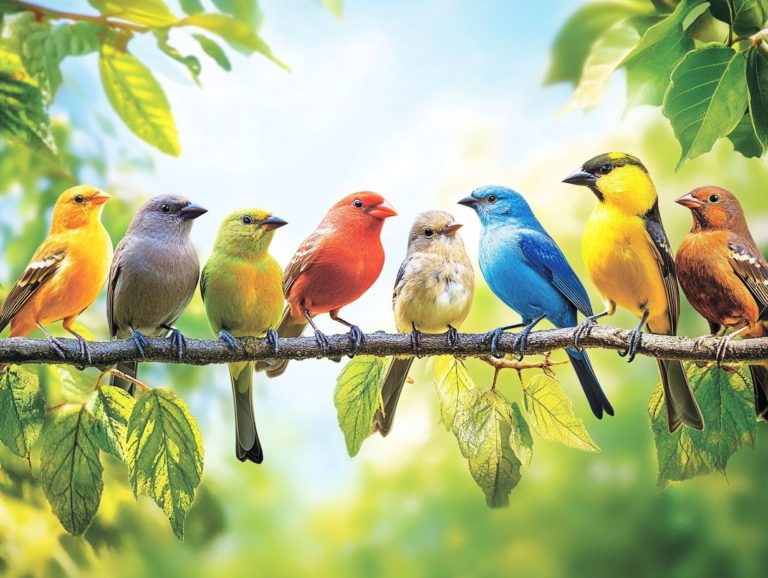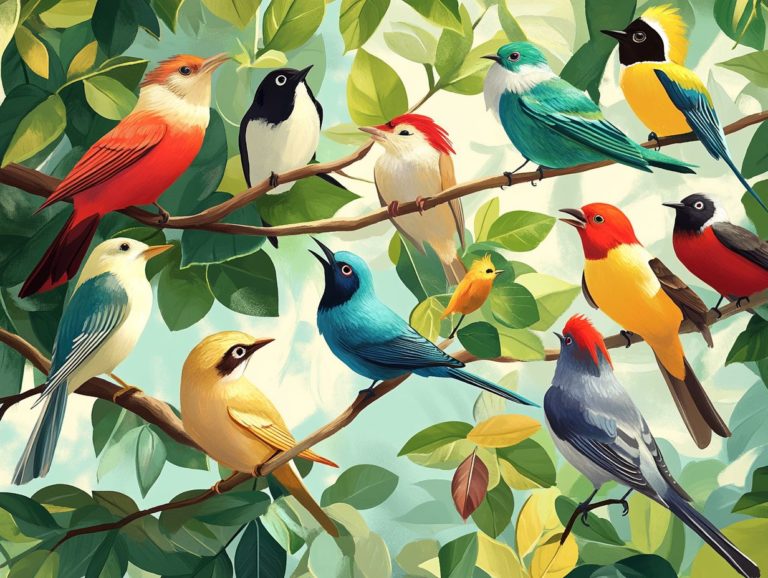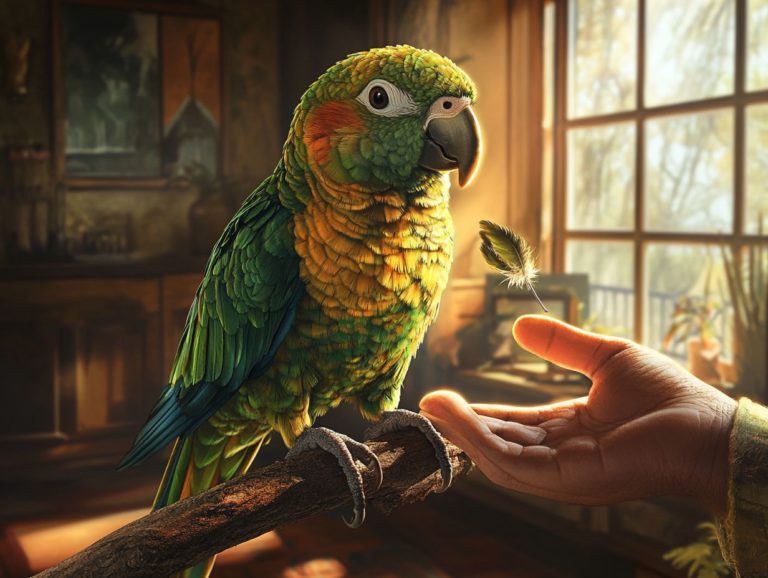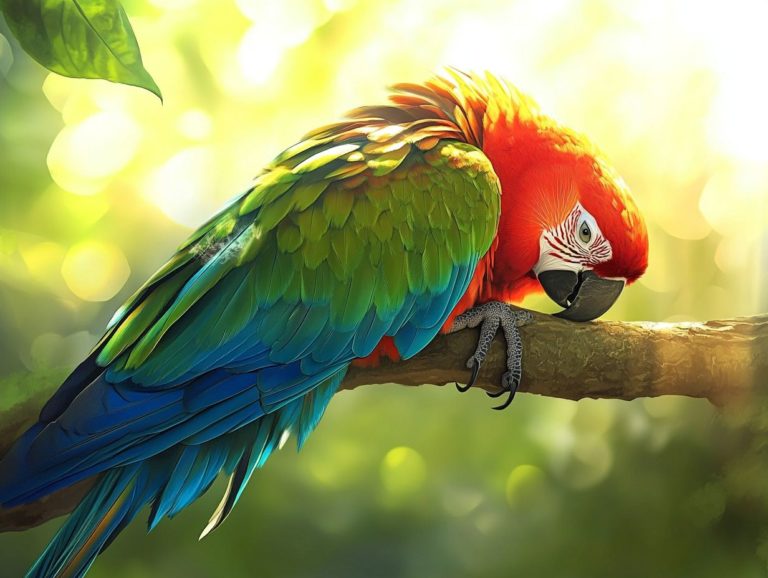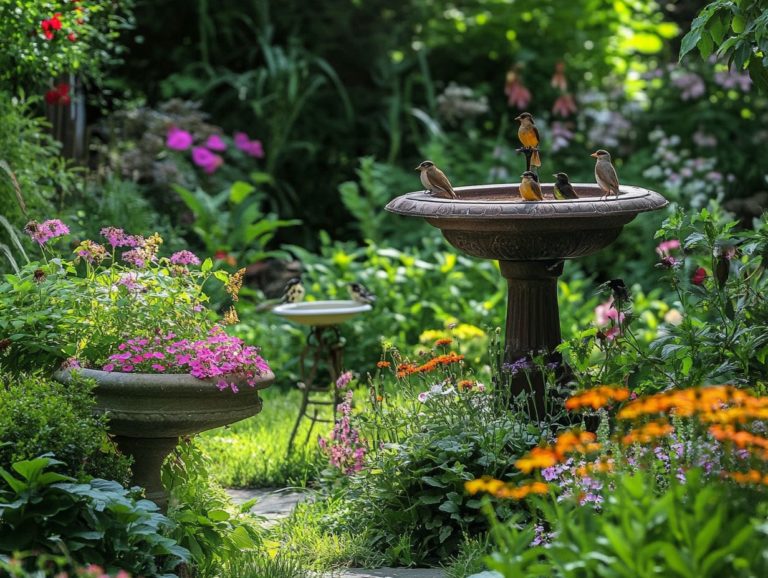How to Choose the Right Bird Species for You
Choosing the right bird species for your new pet can feel like an exciting adventure and a formidable challenge. With many options at your fingertips, it’s crucial to consider key factors ranging from your lifestyle and living environment to your level of long-term commitment and experience. This will help foster a harmonious relationship with your new feathered companion.
This guide delves into popular bird species, such as parakeets and cockatiels, that are ideal for beginners. It outlines common pitfalls to avoid and provides insights on how to prepare your home for their arrival.
Get ready for an exciting journey into the world of pet birds!
Contents
- Key Takeaways:
- Factors to Consider When Choosing a Bird Species
- Experience and Knowledge
- Popular Bird Species for Beginners
- Characteristics and Care Requirements
- Factors to Avoid When Choosing a Bird Species
- Common Mistakes and Misconceptions
- How to Prepare for a New Bird
- Frequently Asked Questions
- What should I consider when choosing the right bird species for me?
- How can I determine the right bird species based on size?
- What should I know about noise level when choosing a bird species?
- How much time and effort will it take to care for a specific bird species?
- Can I choose a bird species based on its temperament?
- What resources are available to help me choose the right bird species for me?
Key Takeaways:
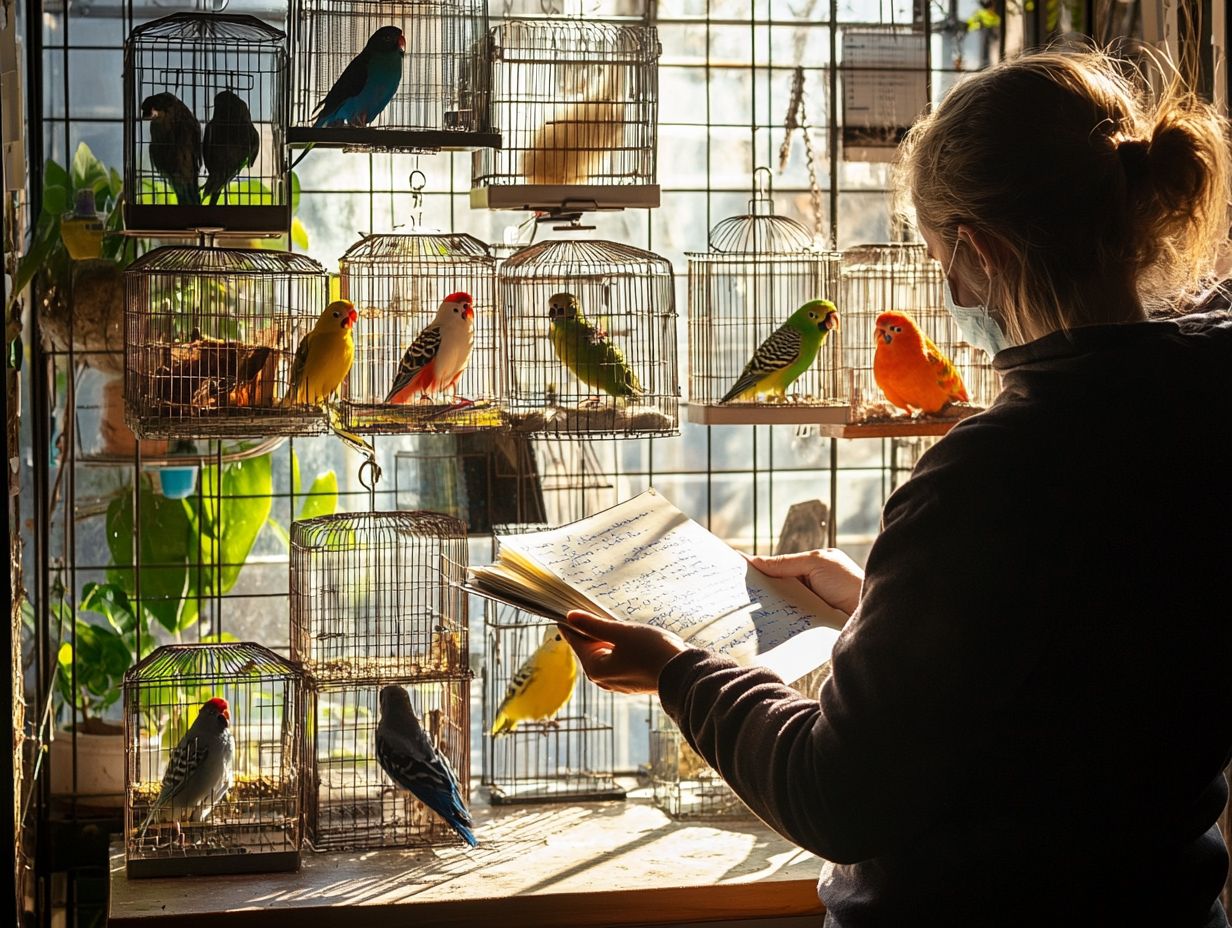
- Consider your lifestyle and living space before choosing a bird species.
- Be realistic about your level of long-term commitment.
- Prioritize your experience and knowledge of bird behavior.
Factors to Consider When Choosing a Bird Species
Selecting the ideal bird species involves several important factors that can greatly affect both the bird’s well-being and your experience as a bird owner. You must take into account your lifestyle, the living space you have available, and the amount of time you can dedicate to caring for these intelligent birds. Additionally, understanding how to choose the right cage for your species is crucial for their comfort and safety.
Affectionate pets such as parakeets, cockatiels, and budgies thrive on social interaction and companionship. They require effective training methods and benefit from structured environments. Therefore, it s essential to align the species’ needs with your capabilities and resources for a harmonious companionship.
Lifestyle and Living Space
When considering lifestyle and living space for your pet birds, grasp their exercise needs and the importance of large cages that allow for movement and play.
A pet bird s well-being is closely tied to the environment you provide. Your lifestyle will dictate specific requirements. For example, if your household is bustling with activity, you might prefer species that thrive on social interaction and are known for their vocal abilities. In contrast, a more serene setting may be better suited for quiet species.
It s essential to craft a habitat that mimics their natural surroundings, complete with perches, toys, and plenty of space for flight. This helps accommodate their playful behaviors. Poor living conditions can lead to behavioral issues and health concerns. Ensuring your feathered friends have the room to stretch their wings, socialize, and exercise is vital.
Proper care means regular interaction and a stimulating environment. Together, these aspects nurture their happiness and longevity.
Level of Commitment
Understanding the commitment required for various bird species is crucial. Many birds can live for decades, with some species having a notably long lifespan. They demand consistent care, training, and health check-ups.
Take larger species like macaws and cockatoos. They can thrive for over 50 years. In contrast, smaller birds like budgerigars may only require about 5 to 10 years of dedicated ownership. This long-term relationship requires you to consider the financial aspects of proper housing, nutrition, and veterinary care, as well as the emotional investment involved in bonding with and nurturing these fascinating birds.
Keeping your feathered friend mentally stimulated with engaging toys and social interaction is key to their happiness. Regular health care practices, including check-ups and vaccinations by avian veterinarians, are essential to ensure their well-being throughout their long lives.
Experience and Knowledge

Having the right experience and knowledge in bird care is essential for anyone considering bird ownership. Understanding bird behavior, training methods, and communication can lead to truly fulfilling companionship.
Not having this foundational knowledge could make your bird ownership journey challenging. Different bird breeds, including talking birds and affectionate pets, come with their own unique personalities and social needs, which require tailored approaches. By investing time in educating yourself about these diverse bird species, such as parakeets, cockatiels, and lovebirds, you can act now to ensure your feathered friends thrive and live their best lives!
Being aware of behavioral cues enhances your training effectiveness and fosters trust, making the relationship more rewarding for both you and your bird companions. Ultimately, an informed owner sets the stage for a harmonious and enriching partnership that celebrates the joys of bird companionship.
Popular Bird Species for Beginners
Get ready to dive into the exciting world of pet birds! Some species naturally emerge as exceptional choices. Parakeets, cockatiels, and doves, celebrated for their friendly dispositions, vocal talents, and manageable care needs, are often regarded as gentle and affectionate companions.
These delightful birds can quickly capture your heart, making them ideal for beginners seeking a rewarding avian experience and fulfilling pet bird enjoyment.
Characteristics and Care Requirements
Each bird species boasts its own unique characteristics and care requirements that you should fully grasp before bringing one home. This includes understanding their specific dietary needs, health care essentials, and companionship desires to nurture their emotional state.
For example, larger parrots, such as African grey parrots and Amazon parrots, often flourish on a diverse diet featuring fresh fruits, vegetables, and high-quality pellets, while smaller species might have different nutritional inclinations. Many birds also need regular veterinary check-ups from avian veterinarians and a carefully monitored living environment to maintain optimal health.
Social interactions are crucial for a bird’s emotional well-being; species like budgerigars, cockatiels, and green-cheeked conures thrive on companionship, both from their human caregivers and fellow feathered friends. By familiarizing yourself with these traits, including their unique personalities, you ll be better equipped to select the right species, paving the way for a fulfilling and harmonious relationship.
Factors to Avoid When Choosing a Bird Species
When choosing a bird species, it’s essential to be mindful of common mistakes and misconceptions regarding pet bird adoption. This awareness is crucial to ensuring a fulfilling experience for both you and your feathered companion, especially when it comes to social interaction and noise levels.
Common Mistakes and Misconceptions
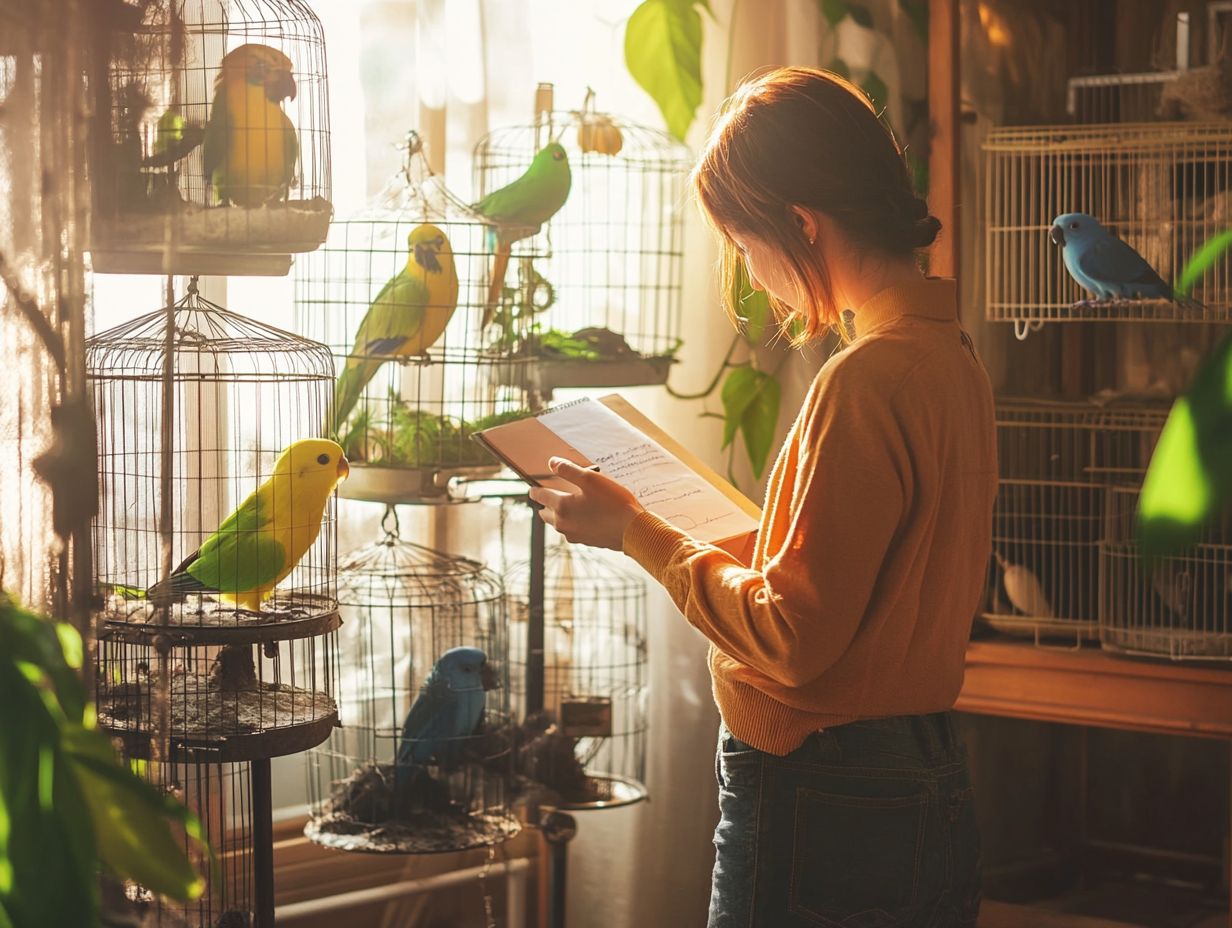
One of the most common missteps new bird owners make is underestimating the significance of proper training methods and communication, which often leads to behavioral issues and misunderstandings.
These challenges can surface in various forms, such as excessive squawking, biting, or even signs of depression in your bird disheartening experiences for both you and your feathered companion, especially when dealing with noisy birds or those with more sensitive emotional states. Understanding bird body language and vocalizations from talking birds is essential for cultivating a healthy relationship and addressing concerns before they spiral into serious problems.
Failing to create a stimulating environment including toys, social interaction, mental exercises, and companionship can also foster undesirable behaviors. Many owners overlook these critical aspects, mistakenly believing that simply providing a cage and food is enough to ensure their bird s well-being.
Start learning today to become the best bird owner you can be!
How to Prepare for a New Bird
Preparing for a new bird involves careful planning, ensuring that both the environment and essential supplies are thoughtfully arranged for their initial care. You ll want to select a suitable bird cage, provide the right food, and choose engaging toys that will facilitate training and bonding.
Setting Up the Environment and Supplies
Creating the perfect environment for your new bird requires a careful balance of proper sanitation, space, and supplies tailored to their exercise needs and overall well-being.
Birds flourish in settings that replicate their natural habitats, so it s vital to select a cage with enough space for movement ideally at least twice their wingspan in width to accommodate their various exercise needs. Regular cleaning is very important; establishing a routine that includes daily spot checks and a thorough weekly sanitization of your bird’s living area will help keep illness at bay.
Don t underestimate the power of engaging toys and perches. Opportunities for bathing and social interaction also significantly enhance their quality of life.
Incorporating a variety of safe foods is also important, along with attention to their nutritional needs. By cultivating a hygienic and enjoyable habitat, this helps your feathered friend thrive and be truly happy!
Training and Bonding with Your Bird
Training and bonding with your new bird is an essential journey that fosters communication and deepens the social bond between you and your feathered friend. This ultimately leads to a more fulfilling relationship and enhances your enjoyment of your pet bird.
Understanding the unique personality traits of different bird species is key to crafting effective training methods tailored to their needs. For example, smaller species like cockatiels or budgies flourish with positive reinforcement techniques, like offering rewards such as treats or praise. On the other hand, larger parrots might require more sophisticated strategies that engage their problem-solving skills.
Establishing a routine not only provides your delightful pet with the structure it craves but also builds trust between you. Devoting quality time to bonding activities whether through playtime, teaching tricks, or simply engaging in conversation enhances your connection and enriches the emotional well-being of both you and your bird.
Frequently Asked Questions
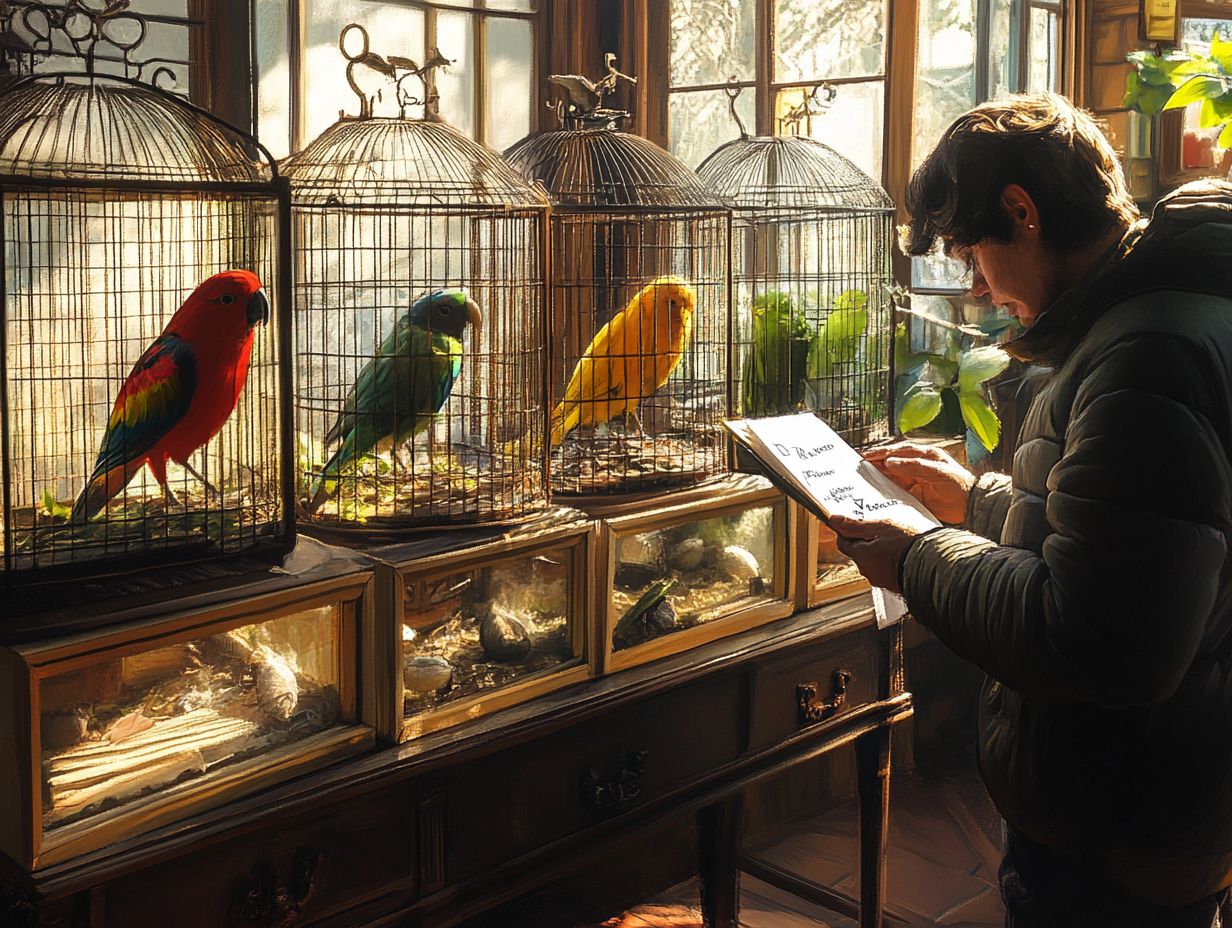
What should I consider when choosing the right bird species for me?
When choosing a bird species, it’s important to consider factors such as size, noise level, care requirements, and temperament. For more guidance on this, check out how to choose the right pet bird for you. These factors will all play a role in determining which bird will be the best fit for you and your lifestyle.
How can I determine the right bird species based on size?
Different bird species come in a variety of sizes, from small finches to large parrots. It’s crucial to consider the space you have available for your bird and choose a species that will comfortably fit in your home.
What should I know about noise level when choosing a bird species?
Birds are known for their vocal abilities, but some species are louder than others. If you live in an apartment or have close neighbors, it may be best to choose a quieter bird species, such as a canary or finch.
How much time and effort will it take to care for a specific bird species?
Different bird species have varying care requirements, so it’s important to research and understand the level of commitment involved. Some birds may require more attention, frequent cleaning, and specialized diets, while others may be lower maintenance.
Can I choose a bird species based on its temperament?
Yes, it’s essential to consider the temperament of a bird species when making your decision. Some birds are more social and crave attention, while others may prefer to keep to themselves. It’s crucial to choose a bird whose personality aligns with yours.
What resources are available to help me choose the right bird species for me?
There are several resources available to help you make an informed decision about which bird species is right for you. These include books, online forums, and talking to experienced bird owners or avian veterinarians.
Ready to pick your perfect bird? Start researching today!

